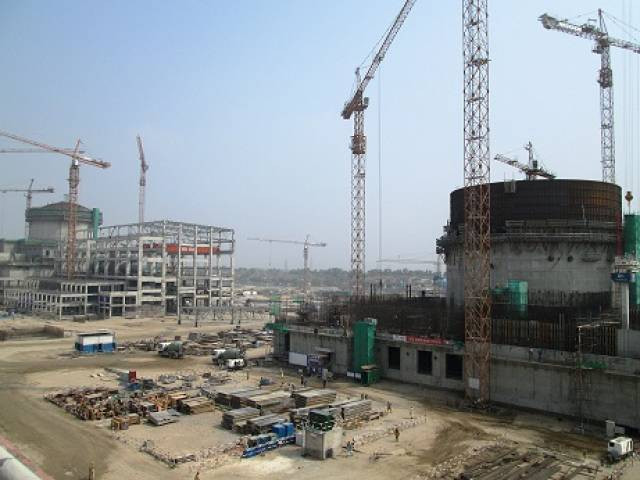Pakistan must look for multiple choices to secure energy supplies
Should avoid US influence and care for its own strategic interests

Should avoid US influence and care for its own strategic interests. PHOTO: FILE
Energy security means national security and the question remains whether Pakistan should compromise on it.
Most American initiatives to forge economic cooperation with Pakistan are accompanied by preconditions that go against Pakistan’s national interests. The US is persistently trying to have its say in Pakistan’s energy matters as it is opposed to the laying of Iran-Pakistan (IP) gas pipeline and Russia-sponsored North-South liquefied natural gas (LNG) pipeline.
Just before the end of Pakistan Peoples Party’s (PPP) government in the first half of 2013, the two countries inaugurated the IP project but later it was put on the backburner due to mounting US pressure. Though sanctions against Iran have been lifted, Pakistan is still unable to push ahead with the project.
Speaking at the 6th Pakistan Energy Forum 2014, former petroleum secretary Dr Gulfraz, who had been part of negotiations on two gas pipelines in 1997, revealed that Afghan warlords had given assurances to Pakistan that they would ensure security of the Turkmenistan-Afghanistan-Pakistan-India (Tapi) pipeline during its construction and later gas flow through the pipeline.
However, he said, consortium leader Unicol pulled out of the project following directives from the US State Department, leaving Pakistan in a critical situation.
Though Pakistan had secured gas supply from Turkmenistan at a cheaper rate with the signing of a pricing framework, the project was delayed due to the change in US stance, he said.
Similarly, Pakistan was close to clinching the IP pipeline deal at that time, but the US offered civil nuclear technology to India, which was part of the IP pipeline earlier, and that led to Delhi’s withdrawal from the project, which disrupted the overall gas import plan.
Strategic importance
Now, two gas pipeline projects are strategically important for Pakistan. Of these, the IP scheme seems to be the most viable as sanctions are gone.
Not only gas, Iran has huge reserves of oil as well. At present, Pakistan meets most of its oil needs through imports from Gulf Arab partners – Saudi Arabia, the United Arab Emirates and Kuwait.
However, it makes sense for Pakistan to forge energy ties with Iran as it sits very close to the Iranian oil and gas deposits. But these ties run against US interests.
Over the years, the US has undertaken two initiatives to keep Pakistan away from energy cooperation with Iran. First, it gave civil nuclear technology to India and then it encouraged Pakistan to sign an LNG deal with Qatar, a strategic partner of the US in energy supplies.
Qatar has huge gas reserves where US and European companies are major stakeholders in LNG trade. This prompted the US to push Pakistan to ink the LNG deal with Qatar and abandon the IP project.
In recent years, the US has been actively promoting the Tapi pipeline in an effort to drive Pakistan away from the IP project. Experts feel Pakistan is facing the same situation that it experienced in 1997 while working on the Tapi project because of the change in US priorities.

However, they fear after the withdrawal of all US forces from Afghanistan, Washington will again be opposing the Tapi pipeline.
Direct energy ties
Pakistan and the US have also been engaged in direct energy cooperation. In a meeting on energy cooperation held in 2014, the US offered to conduct another study to assess the shale oil and gas resources in Pakistan.
The first study was conducted by the US Agency for International Development (USAID), but some areas of Balochistan, Sindh and Khyber-Pakhtunkhwa were not covered.
In this assessment, the risked technically recoverable reserves were estimated at 95 trillion cubic feet of shale gas and 14 billion barrels of shale oil.
Now, Pakistan has agreed to the offer of second study, which will also be undertaken by USAID.
Though the technology is available in advanced economies for tapping the shale reserves, environmental concerns, requirement of a huge quantity of water and high cost of drilling are the real challenges.
Moreover, the time is not ripe for shale oil and gas exploration due to low prices. Even several US companies have put off work on their projects. In Pakistan, the exploration companies need a higher price of $12 per million British thermal units to tap the shale deposits.
Again, the question is why the US is pushing Pakistan to explore the shale gas reserves.
Background interviews with officials reveal that the US in this case too wants to drive attention away from Iran, though several EU and US companies are going to win projects in the Gulf country.
Pakistan and the US have also launched a clean energy programme under which the former is setting up solar and wind-based projects.
Reshaping policy
It is time for Pakistan to reshape its policy and focus on the energy security programme, which will also lead to national security. The country has suffered a lot due to the tilt towards Washington and it should now pursue multiple options to secure future energy supplies.
The writer is a staff correspondent
Published in The Express Tribune, August 22nd, 2016.
Like Business on Facebook, follow @TribuneBiz on Twitter to stay informed and join in the conversation.


















COMMENTS
Comments are moderated and generally will be posted if they are on-topic and not abusive.
For more information, please see our Comments FAQ